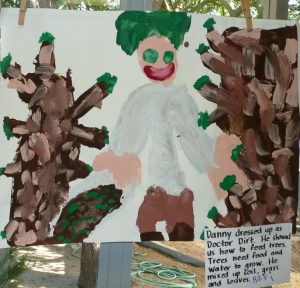 When my children have a teacher, the relationship is between child and teacher, with parents checking in and out as need be. But when my kids move on, the teacher often, I have discovered, becomes an enduring figure in my own life. I have a deep appreciation for teachers, particularly passionate and gifted teachers, having honed extra appreciation from spending time in classrooms with special needs kids.
When my children have a teacher, the relationship is between child and teacher, with parents checking in and out as need be. But when my kids move on, the teacher often, I have discovered, becomes an enduring figure in my own life. I have a deep appreciation for teachers, particularly passionate and gifted teachers, having honed extra appreciation from spending time in classrooms with special needs kids.
While it’s important to volunteer in class if you can, and want, and if your kid wants (i.e. probably not in middle school), a parent’s view of a classroom when the other parents are there for a field trip or an arts project is different than observing from the back of the room as a teacher does his or her magic with the kids. Managing a lot of kids, keeping things interesting while balancing the ever-present (if unactualized) potential for riotous chaos to ensue is likely to be a humbling tutorial for most of us non-teacher parents. Just seeing what it takes to teach effectively is a strong counter-balance to our societal reluctance to truly incentivize teachers the way we do lawyers or doctors. While I recognize that there are a million thorny obstacles to changing our educational system, more consciousness and more interest in the subject will eventually tip the scales of change. Not only should everyone have health care, there is a big difference between saying that no child should be left behind and actually leaving no child behind.
In our culture, teaching is rivaled only by parenting in its gross under-valuation. This is an interesting comment on our society’s values, not to mention its direction. Over the years I have become more a student of happiness than of wealth and power; and I have noticed that when it comes to happy people, teachers seem to have an edge on movers and shakers. It has been said that happiness and well-being comes more from giving than from getting; and teachers, especially if supported and empowered to teach (rather than battle for supplies, or have hands bound by dictated curricula), are free to give a lot—and not to have to question whether what they do matters, they know that it does.
Jeff, one of my kids’ former teachers, is now a facebook friend, and he was kind enough to write on my wall and tell me about an article in the Wall Street Journal that he thought was relevant to this blog. Firstly, I’m just tickled to be living in this age of information, and of people who are interested and sharing ideas across relationships that in the past might have never evolved or continued (i.e. past teachers of our kids).
But, he’s also a gifted teacher and so I took a close look at the article (**). It talks about how Gen Y is failing to learn non-verbal social cues, and at one point talks about Silicon Valley companies declaring meetings “topless” (meaning no lap-tops, cellphones, etc.); it goes on: “Older employees might well accept such a ban, but younger ones might not understand it. Reading a text message in the middle of a conversation isn’t a lapse to them—it’s what you do. It has, they assume, no nonverbal meaning to anyone else.
It does, of course, but how would they know it? We live in a culture where young people—outfitted with iPhone and laptop and devoting hours every evening from age 10 onward to messaging of one kind and another—are ever less likely to develop the “silent fluency” that comes from face-to-face interaction. It is a skill that we all must learn, in actual social settings, from people (often older) who are adept in the idiom. As text-centered messaging increases, such occasions diminish. The digital natives improve their adroitness at the keyboard, but when it comes to their capacity to ‘read’ the behavior of others, they are all thumbs.”
This is an interesting point, in view of the apparent rise of “spectrum” disorders (typified by poor social relatedness and impaired language). The article concludes: “Lots of folks grumble about the diffidence, self-absorption and general uncommunicativeness of Generation Y. The next time they face a twenty-something who doesn’t look them in the eye, who slouches and sighs for no apparent reason, who seems distracted and unaware of the rising frustration of the other people in the room, and who turns aside to answer a text message with glee and facility, they shouldn’t think, ‘What a rude kid.’ Instead, they should show a little compassion and, perhaps, seize on a teachable moment. ‘Ah,’ they might think instead, ‘another texter who doesn’t realize that he is communicating, right now, with every glance and movement—and that we’re reading him all too well.’”
So let’s dedicate today to keeping the fine art of really connecting alive, in gratitude for our teachers, but in service of all our collective children, diffident and texty as they may be.
Namaste, Bruce



{ 1 comment… read it below or add one }
Today (on my 46th birthday) I got “in trouble” for texting during yoga class.
We were all in pigeon pose and I was trying to sneak in a text to another mom about a possible sleep over. Fortunately when I was “busted” the yoga teacher was very sweet to granting me a dispensation – “as a mom and a writer”.
But the idea of a topless business meeting can obviously applied to all ages, and many more contexts than just business meetings
Thanks for the post Bruce